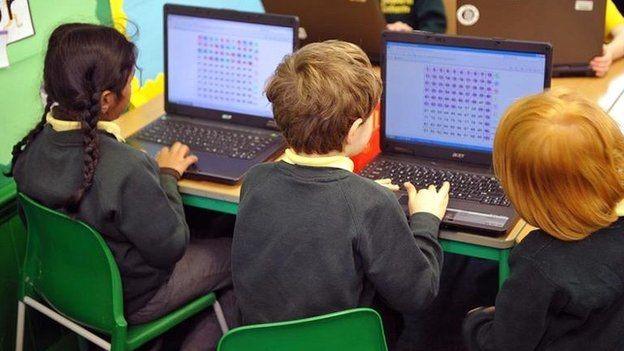Sats protest: Parents speak out over testing
- Published

Parents in England are taking a stance against Standard Assessment Tests (Sats) and some have used social media to highlight the issue.
#KidsStrike3rdMay, #letkidsbekids and Dear Ms Morgan - in reference to the education secretary - have all been trending on Twitter as parents protest over testing young children at school.
Also, an online petition created by a group of parents has seen more than 45,000 signatures supporting teachers in boycotting Sats.
Here, parents explain why they want their children to face fewer tests.

Wendy from West Yorkshire is a mother and part-time teacher.
"I have taken my children out of school as a statement to the government that we should have a say in this process.
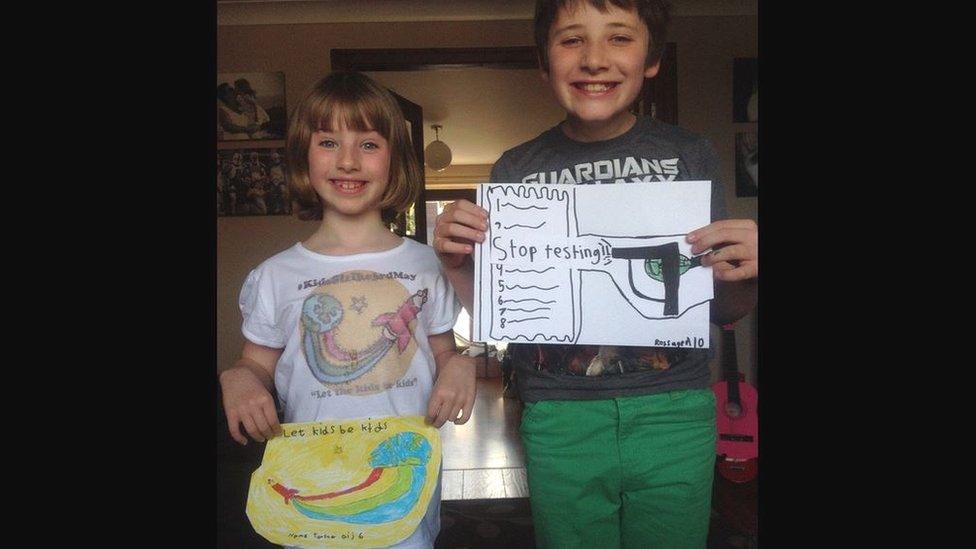
"My children have been making posters this morning and we will be going to a local museum.
"The government is not listening to teachers or head teachers.
"The tests are so hard and unobtainable for some. It saps the fun out of learning, and once there is a loss of love for learning it is hard to get back.
"Where I teach there is the formal government testing in May that is really a test on the school's performance.
"Where my children go to school, they have informal tests three or four times a year.
"We [teachers] assess children every day and we know where they are academically so there is no need for all of these tests - the government should trust our judgement.
"My youngest one will take it in her stride but my older child is a lot more aware and worries about failing.
"I have no objection to tests, but they need to be relevant to daily life and not abstract.
"There is a place for Sats but not necessarily for young children."

Ben Ramalingam in Brighton is a parent of a five-year-old and an organiser of a rally in Preston Park.
"My child is already being prepared for testing next year and is being trained and coached by teachers.
"Tests are poorly designed and implemented, and there is over-testing and irrelevant testing.
"At six years old, children are expected to be at the same stage as eight-year-olds as a lot of learning by rote is squeezed in a short space of time.
"There is a narrow focus on literacy and numeracy. For example, children are expected to learn specific elements of grammar that I as a writer might not even know!
"It's experimenting on our children that may not work.
"Schools have written letters of support of the action parents are taking.
"About 1,000 people turned up at Preston Park today. It is a day of learning for our children - there are workshops of storytelling, writing, art, and yoga, and a series of speeches including one from the children's laureate Chris Riddell, external.
"Instead of looking to China where children are stressed and disengaged, we should be learning about teaching in Finland and support deep learning that will engender creativity and a prosperous economy in the UK.
"We're willing to stand up for educational freedom, and freedom to learn is one of the most important things in democracy."

Sarah Hughes took her six-year-old son out of school.
On the Victoria Derbyshire, external programme she said parents were concerned by the amount of time devoted to preparing children for tests.
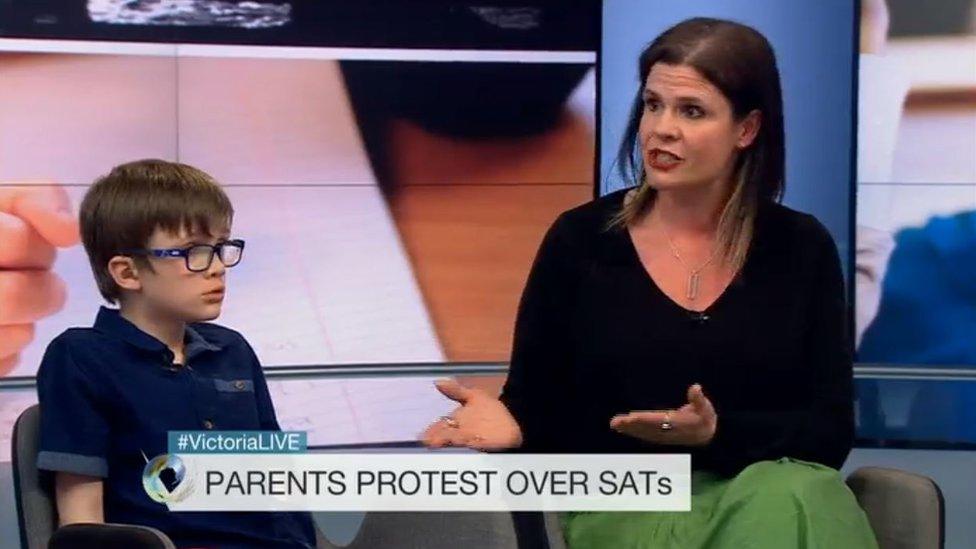

Simone in Bath has chosen not to take her children out of school but supports the protest.
"I didn't want my youngest to find out about her Sats test so I decided to keep her in school.
"Teachers at the school have not told children about the tests so as not to stress them out, but they need to prepare for them.
"But last week, although she is very bright, my seven-year-old came home in tears because she couldn't do something that was taught to her at school.
"She was so worried she said, 'Mummy, if I don't pass I won't get a job.'
"For my 11-year-old, the practice questions are crazy.
"I'm a graduate with a first-class honours degree and my mother-in-law is a professor, and yet none of us could understand a question given to my daughter about subjunctive verbs.
"Also, changes have been made from last year so subjects have to be relearned.
"Teachers are panicking but they're doing their best.
"I would like to see more teacher-led assessments, as they know my child is doing well. There should be more creativity and learning about real life.
"I don't want children needing therapy because of tests - schools are becoming like exam factories."
Compiled by Andree Massiah
- Published3 May 2016
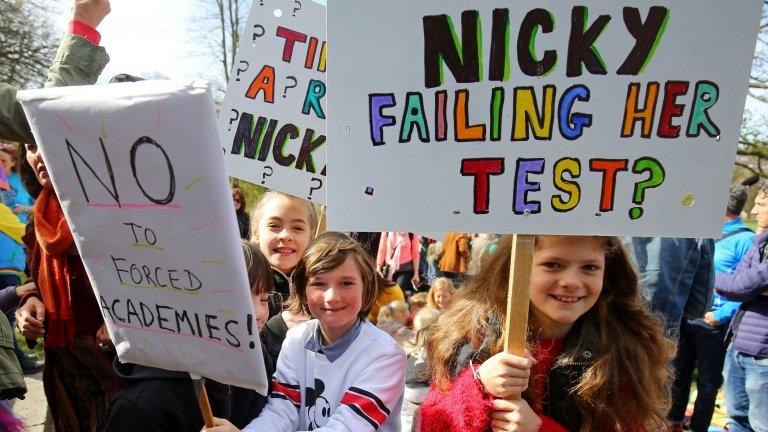
- Published29 April 2016
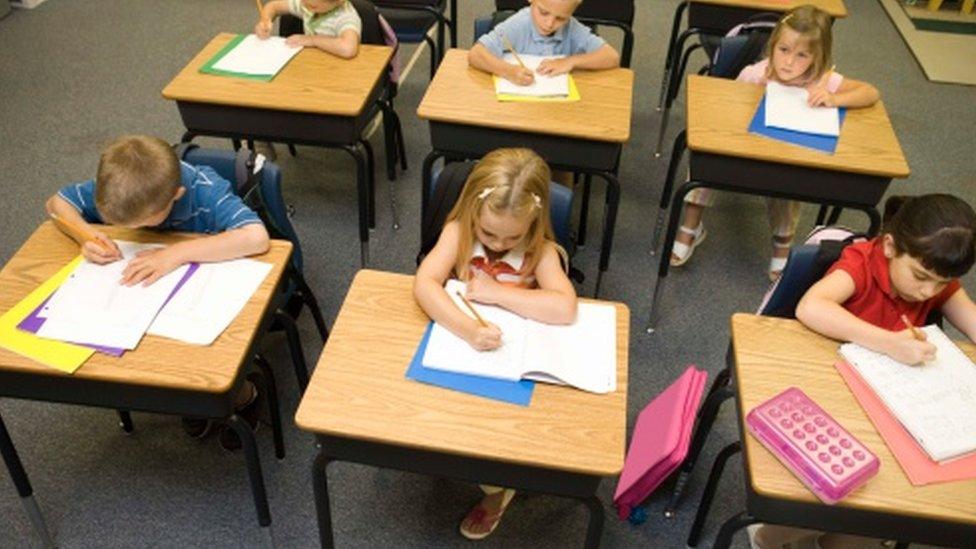
- Published10 May 2016
